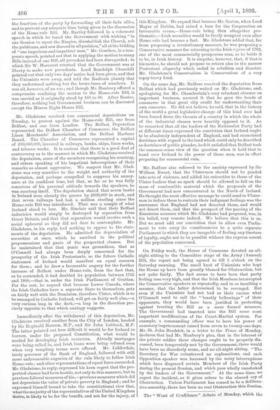Mr. Gladstone received two commercial deputations on Tuesday, to protest
against the Home-rule Bill, one from Belfast, and one from London. The Belfast Deputation represented the Belfast Chamber of Commerce, the Belfast Linen Merchants' Association, and the Belfast Harbour Board. The Chamber of Commerce represented a capital of 280,000,000, invested in railways, banks, ships, linen works, and tobacco works. It is curious that there is a good. deal of controversy as to the manner in which Mr. Gladstone received the deputation, some of the members recognising his courtesy, and others speaking of his impatient interruptions of their remarks as almost aggressive. We suspect that Mr. Glad- stone was very sensitive to the weight and authority of the deputation, and perhaps compelled to suppress his annoy- ance at its confident tone, but that, so far as he was fully conscious of his personal attitude towards the speakers, he was courtesy itself. The deputation stated that seven banks in Ireland were already the poorer by 2938,000 in stock, and that seven railways had lost a million sterling since the Home-rule Bill was introduced. That was a sample of what Ireland stood to lose. Mr. Sinclair said that their Belfast industries would simply be destroyed by separation from Great Britain, and that that separation would involve such a social upheaval as they did not dare to contemplate. Mr. Gladstone, in his reply, had nothing to oppose to the state- ments of the deputation. He admitted the depreciation of securities at once, which he ascribed to the political prepossessions and panic of the propertied classes. But he maintained that that panic was groundless, that as O'Connell had always been deeply concerned for the prosperity of the Irish Protestants, so the future Catholic statesmen of Ireland would manifest an equal concern for them ; and he drew a favourable augury for the further increase of Belfast under Home-rule, from the fact that, as he contended, it had doubled its population between 1782 and 1800,—that is, under the Irish Parliament of Grattan. For the rest, he argued that because Lower Canada, where the Irish Catholics have a separate State to themselves, gets on fairly well with the Dominion, therefore Ulster, which is to be swamped in Catholic Ireland, will get on fairly well also,—a very curious leap in. the dark,—a leap in the direction pre- cisely opposite to that which analogy suggests.


































 Previous page
Previous page